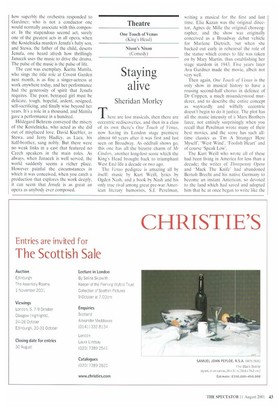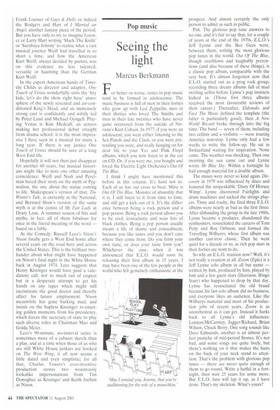Theatre
One Touch of Venus (King's Head)
Nixon's Nixon (Comedy)
Staying alive
Sheridan Morley
There are lost musicals, then there are eccentric rediscoveries, and then in a class of its own there's One Touch of Venus, now having its London stage premiere almost 60 years after it was first and last seen on Broadway. As oddball shows go, this one has all the bizarre charm of Mr Cinders, another long-lost score which the King's Head brought back to triumphant West End life a decade or two ago.
The Venus pedigree is amazing all by itself: music by Kurt Weill, lyrics by Ogden Nash, and a book by Nash and his only true rival among great pre-war American literary humorists, S.J. Perelman,
writing a musical for the first and last time. Elia Kazan was the original director, Agnes de Mille the original choreographer, and the show was originally conceived as a Broadway debut vehicle for Marlene Dietrich, but when she backed out early in rehearsal the role of the statue which comes to life was taken on by Mary Martin. thus establishing her stage stardom in 1943. Five years later Ava Gardner made the movie, albeit not very well.
Then again, One Touch of Venus is the only show in musical history to have a rousing second-half chorus in defence of Dr Crippen, a much misunderstood murderer, and to describe the entire concept as waywardly and wilfully eccentric doesn't begin to do it justice. The plot has all the manic intensity of a Marx Brothers farce, not entirely surprisingly when you recall that Perelman wrote many of their best movies, and the score has such alltime classics as 'I'm A Stranger Here Myself', 'West Wind', 'Foolish Heart' and of course 'Speak Low'.
The Kurt Weill who wrote all of these had been living in America for less than a decade; the writer of Threepenny Opera and 'Mack The Knife' had abandoned Bertolt Brecht and his native Germany to become an instant American, so devoted to the land which had saved and adopted him that he at once began to write like the
Frank Loesser of Guys & Dolls or indeed the Rodgers and Hart of I Married an Angel, another fantasy piece of the period. But you have only to try to imagine Loesser or Larry Hart writing 'Mack The Knife' or 'Surabaya Johnny' to realise what a vast musical journey Weill had travelled in so short a time, and how the American Kurt Weill, always derided by purists, was on this evidence no less talented, versatile or haunting than the German Kurt Weill.
In the expert American hands of Timothy Childs as director and adaptor, One Touch of Venus wonderfully suits the 'hey kids, let's do the show right here' atmosphere of the newly reseated and air-conditioned King's Head, and an immensely strong cast is confidently and wittily led by Peter Land and Michael Gyngell. Playing Venus is Kim Medealf, an actress making her professional debut straight from drama school: it is the most impressive I have seen in a musical for many a long year. If there is any justice One Touch of Venus should be sure of a long West End life.
Hopefully it will not then just disappear for another 60 years, but musical historians might like to note one other amazing coincidence: Weill and Nash and Perelman based their story on the myth of Pygmalion, the one about the statue coming to life. Shakespeare's version of that, The Winter's Tale, is currently at the National, and Bernard Shaw's version of the same myth is at the centre of My Fair Lady at Drury Lane. A summer season of hits and myths, in fact, all of them fabulous for once in the literal meaning of the word — based on a fable.
At the Comedy, Russell Lees's Nixon's Nixon finally gets a West End home after several years on the road here and across the United States. This is the brilliant twohander about what might have happened on Nixon's final night in the White House back in August 1974. Lees suggests that Henry Kissinger would have paid a valedictory call, not so much out of respect but in a desperate attempt to get his hands on any tapes which might still incriminate the good doctor and thereby affect his future employment. Nixon meanwhile has gone barking mad, and insists on the hapless Kissinger re-enacting golden moments from his presidency, which forces the secretary of state to play such diverse roles as Chairman Mao and GoIda Meier.
Lees's 90-minute, no-interval satire is sometimes more of a cabaret sketch than a play, and at a time when those of us who are still White House junkies are hooked on The West Wing, it all now seems a little dated and even simplistic; for all that, Charles Towers's ever-inventive production scores two wondrously lookalike impersonations from Tim Donoghue as Kissinger and Keith Jochim as Nixon.



























































 Previous page
Previous page